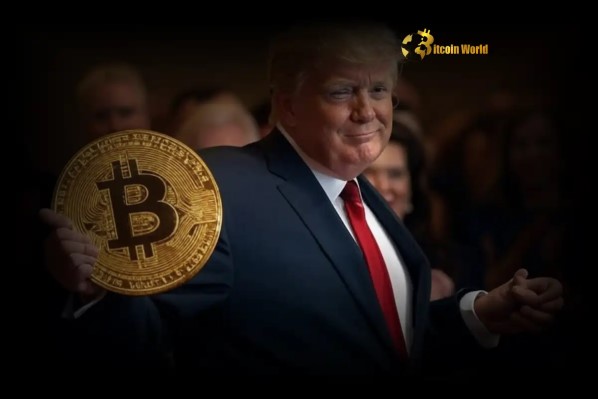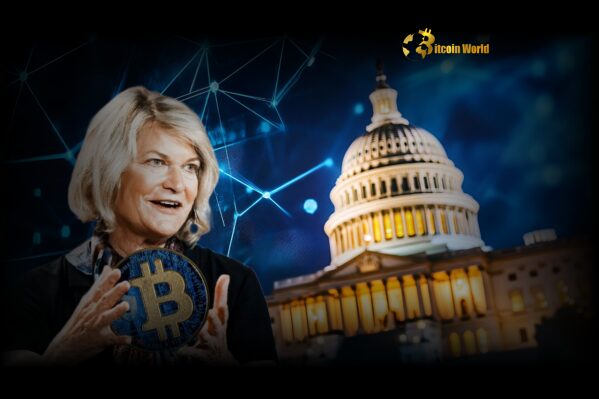BitcoinWorld

US Crypto Policy: Trump’s Ambitious Plan to Make US a Crypto Hub
Are you wondering about the future direction of US crypto policy? Recent comments from a key figure associated with former President Donald Trump’s campaign shed light on a potential shift that could dramatically reshape the landscape for digital assets in the United States.
What is the Vision for Trump Crypto Policy?
According to a report shared by Walter Bloomberg on X, U.S. Treasury Secretary Scott Bessent, a figure reportedly being considered for a Treasury role should Trump be re-elected, stated that President Trump’s aim is to position the United States as a leading digital innovation hub. This vision stands in stark contrast, he suggests, to the current administration’s approach to crypto regulation.
Bessent’s comments highlight a perceived difference in philosophy between the potential future administration and the current one regarding the digital asset space. The core idea presented is that a Trump presidency would actively seek to foster growth and innovation in the crypto sector, rather than primarily focusing on stringent control and enforcement.
How Does This Compare to Biden Crypto Regulation?
The Biden administration’s approach to crypto regulation has often been characterized by a focus on consumer protection, financial stability, and combating illicit finance. While executive orders have called for a whole-of-government approach to understanding and potentially regulating digital assets, many in the crypto industry have voiced concerns about the perceived lack of regulatory clarity and what they see as an enforcement-heavy approach by agencies like the Securities and Exchange Commission (SEC) and the Commodity Futures Trading Commission (CFTC).
Critics argue that this regulatory uncertainty and aggressive enforcement have stifled innovation and pushed crypto businesses and talent overseas. Bessent’s reported statement directly addresses this sentiment, claiming that the current regulatory environment has “nearly collapsed the crypto industry” in the U.S. This is a strong claim that reflects a common grievance within certain segments of the crypto community.
Key characteristics often associated with the Biden administration’s approach include:
- Emphasis on existing securities laws for many tokens.
- Increased enforcement actions against crypto companies.
- Calls for greater international cooperation on regulation.
- Focus on potential risks rather than just benefits.
A potential shift under a Trump administration, as suggested by Bessent, would likely involve a different regulatory philosophy, potentially prioritizing innovation and attracting businesses over strict, perhaps ambiguous, oversight.
Why Aim to Make the U.S. a US Crypto Hub?
The ambition to make the U.S. a premier US crypto hub is driven by several potential benefits:
- Economic Growth: A thriving crypto industry can create jobs, attract investment, and contribute to GDP.
- Technological Leadership: Fostering innovation ensures the U.S. remains at the forefront of emerging technologies like blockchain and digital assets.
- Capital Attraction: Creating a favorable environment encourages crypto companies to domicile and operate within the U.S., keeping capital and talent domestically.
- Tax Revenue: A growing industry generates significant tax revenue for the government.
- Global Competitiveness: Other nations, such as parts of Europe, the UAE, and various Asian countries, are actively vying to attract crypto businesses. Becoming a hub ensures the U.S. doesn’t fall behind.
Achieving this status would likely require more than just a change in rhetoric. It would necessitate clear, predictable, and potentially tailored regulatory frameworks that address the unique nature of digital assets, rather than trying to fit them into existing, sometimes ill-suited, categories.
What Challenges Lie Ahead for Crypto Regulation Reform?
While the vision of a U.S. crypto hub is appealing to many, the path to achieving it is fraught with challenges:
- Political Division: Crypto regulation is a politically charged issue, with differing views even within the same party. Passing comprehensive legislation can be difficult.
- Regulatory Hurdles: Various agencies (SEC, CFTC, Treasury, Federal Reserve) have overlapping or distinct jurisdictions, making coordinated policy challenging.
- Consumer Protection: Balancing innovation with the need to protect consumers and investors from fraud and market manipulation is crucial and complex.
- Illicit Finance Concerns: Addressing the potential for cryptocurrencies to be used in illicit activities remains a significant concern for policymakers and law enforcement.
- Industry Maturity: The crypto market is still relatively young and volatile, presenting unique regulatory challenges compared to traditional finance.
Any significant reform of crypto regulation would require navigating these complexities and finding common ground among diverse stakeholders.
Actionable Insights for the Reader
For those interested in the crypto market and its future in the U.S., here are some key takeaways:
- Stay Informed: Pay close attention to statements from political candidates and their advisors regarding their stance on digital assets.
- Monitor Policy Proposals: As the election approaches and potentially after, watch for specific policy proposals or legislative efforts related to crypto.
- Understand the Nuances: Recognize that achieving a balanced regulatory framework is complex and involves various trade-offs.
- Consider Global Trends: Observe how other countries are approaching crypto regulation and how that impacts global competitiveness.
The discussion around making the U.S. a crypto hub is not just political rhetoric; it could have tangible impacts on investment, innovation, and the accessibility of digital assets for everyone.
Conclusion: A Pivotal Moment for US Crypto Policy?
Treasury Secretary Scott Bessent’s comments regarding Donald Trump’s ambition to transform the U.S. into a digital innovation hub, specifically contrasting it with the perceived impact of current Biden crypto regulation, highlight a significant potential turning point for the industry. The vision of a welcoming regulatory environment designed to foster growth and attract talent stands in sharp opposition to the critiques leveled against the current administration’s approach, which some argue has hindered domestic progress and pushed activity elsewhere.
While the path to becoming a true US crypto hub involves overcoming substantial political and regulatory hurdles, the explicit statement of this goal signals a potential shift in priorities. As the political landscape evolves, the debate over the optimal approach to crypto regulation in the United States will undoubtedly continue to be a central theme, shaping the future trajectory of digital assets both domestically and globally. The outcome of this debate will likely determine whether the U.S. embraces its potential to lead the world in this transformative technology or continues on a path that critics argue risks falling behind.
To learn more about the latest crypto regulation trends, explore our article on key developments shaping US crypto policy institutional adoption.
This post US Crypto Policy: Trump’s Ambitious Plan to Make US a Crypto Hub first appeared on BitcoinWorld and is written by Editorial Team





